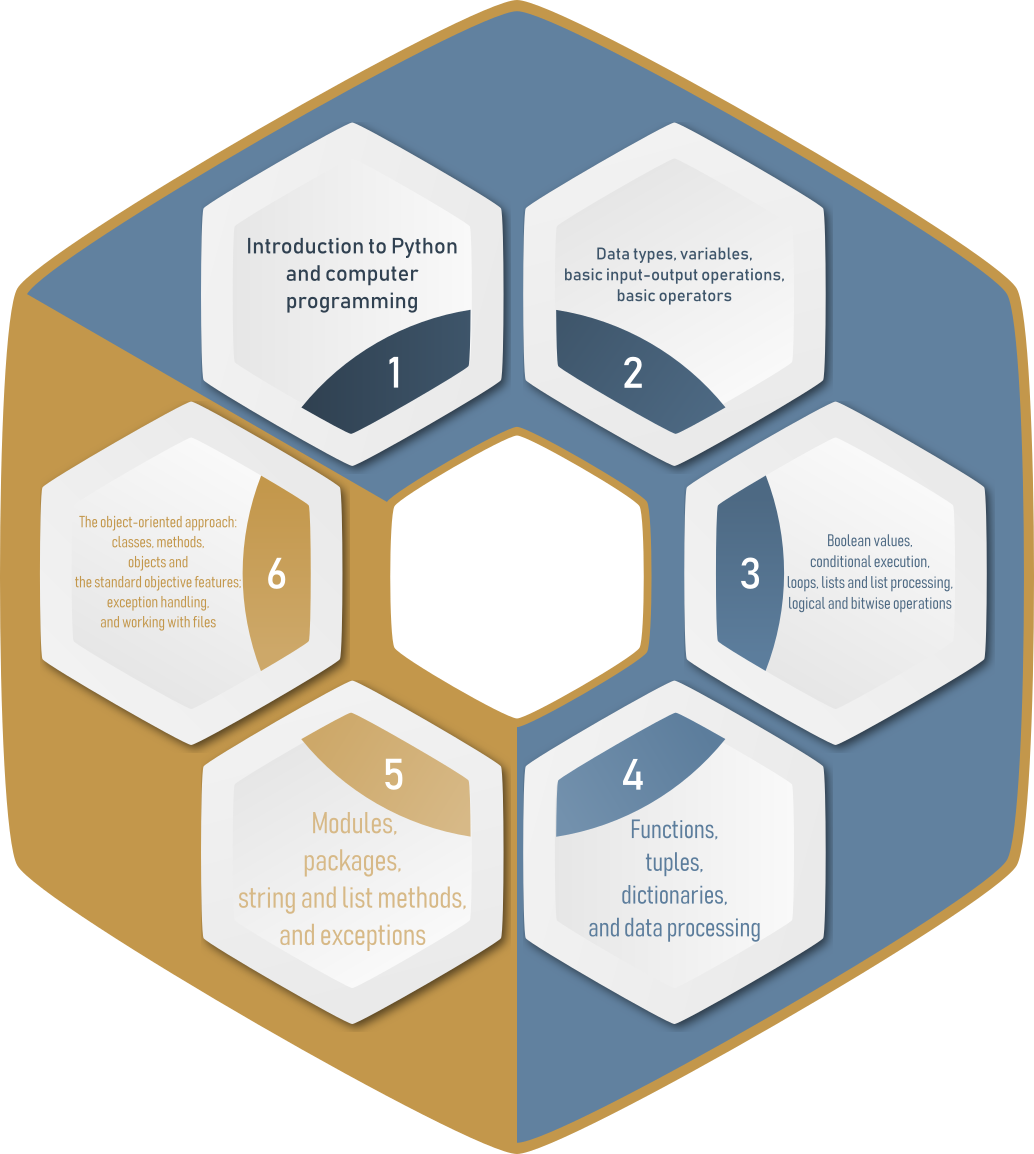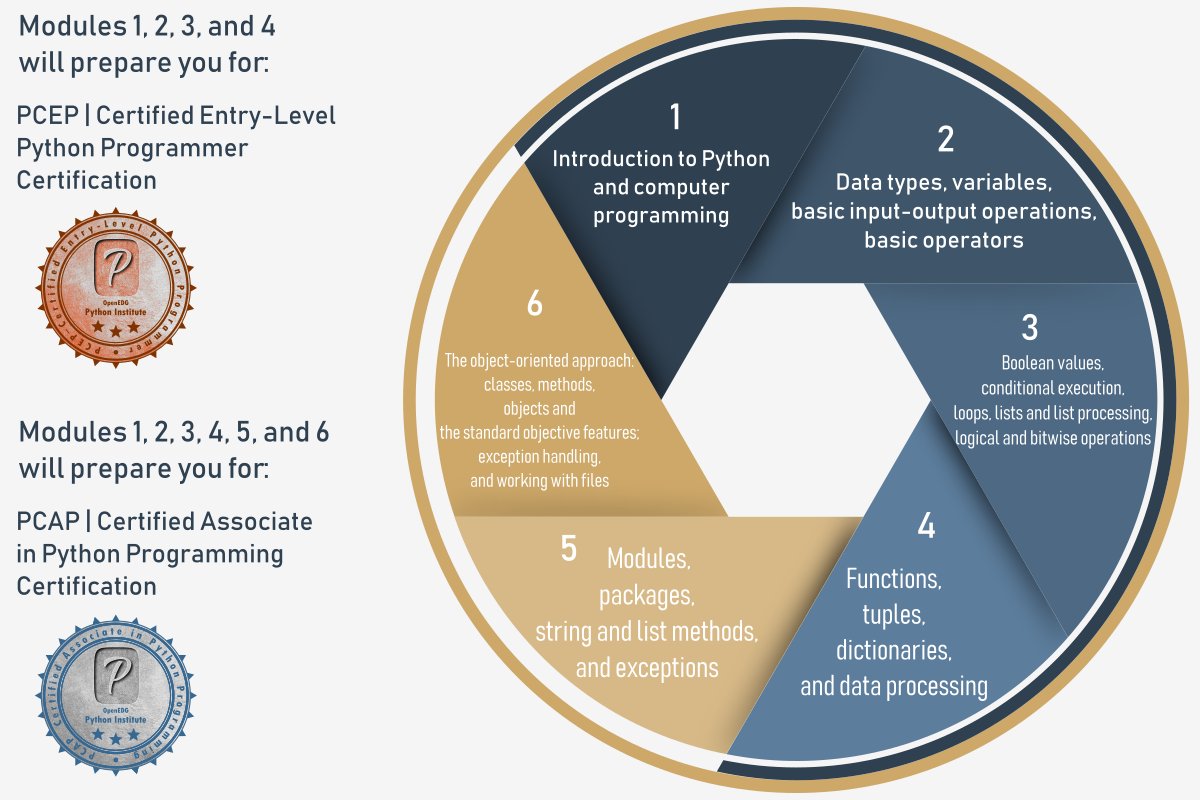About the course curriculum
The PCAP: Programming Essentials in Python course (short form: Python Essentials) covers all the basics of programming in Python, as well as general computer programming concepts and techniques.
The course also familiarizes the student with object-oriented approach. The course is broken down into six modules.
Each student has access to hands-on practice materials, labs, quizzes, and assessments to learn how to utilize the skills and knowledge gained on the course and interact with some real-life programming tasks and situations.
Students who complete the course will be able to accomplish coding tasks related to the basics of programming in the Python language, and to understand the fundamental notions and techniques used in object-oriented programming.
Furthermore, they will be ready to attempt the following qualifications:
- PCEP - Certified Entry-Level Python Programmer;
- PCAP - Python Certified Associate Programmer.
from the OpenEDG Python Institute.

Course Modules vs. PCEP and PCAP Certifications (click to enlarge)
- PCEP - Certified Entry-Level Python Programmer certification: a professional credential that measures your ability to accomplish coding tasks related to the essentials of programming in the Python language. A test candidate should demonstrate sufficient knowledge of the universal concepts of computer programming, the syntax and semantics of the Python language as well as the skills in resolving typical implementation challenges with the help of the Python Standard Library.
PCEP - Certified Entry-Level Python Programmer certification shows that the individual is familiar with universal computer programming concepts like data types, containers, functions, conditions, loops, as well as Python programming language syntax, semantics, and the runtime environment.
PCEP - Certified Entry-Level Python Programmer certification is an interim step to the PCAP - Certified Associate in Python Programming certification and the starting point to launch a career in software development, Python programming, and related technologies. Becoming PCEP certified will help you stand out from other candidates and get your foot in the door.
- PCAP - Python Certified Associate Programmer certification: a professional credential that measures your ability to accomplish coding tasks related to the basics of programming in the Python language and the fundamental notions and techniques used in object-oriented programming.
PCAP - Certified Associate in Python Programming certification shows that the individual is familiar with general computer programming concepts like conditional execution, loops, Python programming language syntax, semantics, and the runtime environment, as well as with general coding techniques and object-oriented programming.
Becoming PCAP certified ensures that the individual is fully acquainted with all the primary means provided by Python 3 to enable her/him to start her/his own studies, and to open a path to the developer's career.

Course Modules vs. PCEP and PCAP Certifications (click to enlarge)
Course syllabus
Module 1 - Introduction to Python and Computer Programming
- Python - a tool, not a reptile
- There is more than one Python
- Let's start our Python adventure
Module 2 - Data Types, Variables, Basic Input-Output Operations, Basic Operators
- Your first program
- Python literals
- Operators - data manipulation tools
- Variables - data-shaped boxes
- How to talk to computer?
Module 3 - Boolean Values, Conditional Execution, Loops, Lists and List Processing, Logical and Bitwise Operations
- Making decisions in Python
- Python's loops
- Logic and bit operations in Python
- Lists - collections of data
- Sorting simple lists - the bubble sort algorithm
- Lists - some more details
- Lists in advanced applications
Module 4 - Functions, Tuples, Dictionaries, and Data Processing
- Writing functions in Python
- How functions communicate with their environment?
- Returning a result from a function
- Scopes in Python
- Let's make some fun... sorry, functions
- Tuples and dictionaries
Module 5 - Modules, Packages, String and List Methods, and Exceptions
- Using modules
- Some useful modules
- What is package?
- Errors - the programmer's daily bread
- The anatomy of exception
- Some of the most useful exceptions
- Characters and strings vs. computers
- Python's nature of strings
- String methods
- Strings in action
- Four simple programs
Module 6 - The Object-Oriented Approach: Classes, Methods, Objects, and the Standard Objective Features; Exception Handling, and Working with Files
- Basic concepts of object programming
- A short journey from procedural to object approach
- Properties
- Methods
- Inheritance - one of object programming foundations
- Exceptions once again
- Generators and closures
- Processing files
- Working with real files